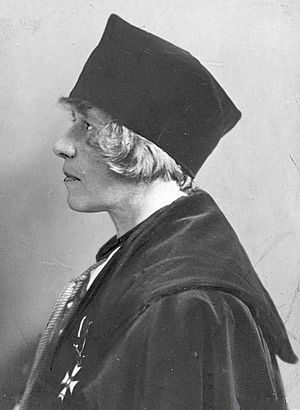Cezaria Jędrzejewiczowa facts for kids
Quick facts for kids
Cezaria Baudouin de Courtenay-Ehrenkreutz-Jędrzejewiczowa
|
|
|---|---|

Cezaria Jędrzejewiczowa in 1934
|
|
| Born | August 2, 1885 Dorpat (modern Tartu, Estonia)
|
| Died | February 28, 1967 (aged 81) |
| Nationality | Polish |
| Alma mater | Saint Petersburg Imperial University |
| Scientific career | |
| Fields | ethnography, ethnology, linguistics, museology |
| Institutions | Stefan Batory University of Wilno University of Warsaw Polish Scientific Institute of Jerusalem Polish University Abroad |
Cezaria Jędrzejewiczowa (1885–1967) was a famous Polish scientist. She was an expert in art history and anthropology. She helped start the study of ethnology in Poland. She was also one of the first scientists to use phenomenology to study folk culture.
Contents
Life of a Pioneer Scientist
Cezaria was born on August 2, 1885, in Dorpat, which is now Tartu, Estonia. Her father was Jan Niecisław Baudouin de Courtenay, a well-known expert in languages. Her mother was Romualda Bagnicka.
Early Education and Achievements
In 1911, Cezaria made history at the Saint Petersburg Imperial University. She was one of the first women to earn a university degree there. Her main project was about a 16th-century prayer book. While studying, she helped create a group called "Spójnia" for Polish women students. She also wrote two books about languages during this time.
Becoming a Professor
After her studies, Cezaria returned to Poland. She taught at private schools for girls in Warsaw. In 1922, she earned her "habilitation" at the University of Warsaw. This allowed her to become a university professor. Her work was about "St. Cecylia," published in a journal called Lud (Folk).
Between 1927 and 1935, she became a professor at the Stefan Batory University in Wilno (now Vilnius, Lithuania). She started new departments there for ethnography and ethnology. She loved doing research outside the classroom with her students. She also taught full-time at a state high school for girls. In 1935, she moved to the Warsaw University. She worked there until the Nazi-Soviet invasion of Poland in 1939.
Life During Wartime and Beyond
Cezaria was married three times. Her last husband, Janusz Jędrzejewicz, was a former Prime Minister of Poland. During World War II, she left Poland and went to Palestine. There, she helped start the Polish Scientific Institute of Jerusalem. This was like a university for Polish soldiers who were far from home.
In 1947, she moved to Great Britain. She helped create the Polish Scientific Society in Exile. In 1951, she became a professor of ethnography at the Polish University Abroad. Soon after, she was chosen to be its rector, which is like being the head of the university.
Cezaria Jędrzejewiczowa passed away on February 28, 1967, in London. She was 82 years old.
See also
 In Spanish: Cezaria Baudouin de Courtenay Ehrenkreutz Jędrzejewiczowa para niños
In Spanish: Cezaria Baudouin de Courtenay Ehrenkreutz Jędrzejewiczowa para niños
 | Isaac Myers |
 | D. Hamilton Jackson |
 | A. Philip Randolph |

